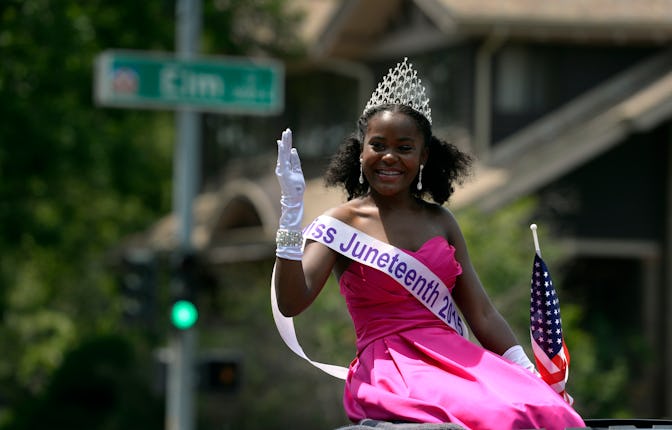The importance of the legendary Miss Juneteenth beauty pageant
This staple of Black culture and excellence is so much more than a beauty competition.

Earlier this month, 16-year-old Madison Corzine was crowned Miss Juneteenth Fort Worth. The newest queen of freedom graciously accepted her crown after participating in a four-day long pageant in Texas that included categories for essay writing, interview questions, talent, and evening gown. Her prize: A $1,000 scholarship to the junior college, college, or training institute of her choice. But it’s also so much more than that.
Juneteenth, or Freedom Day, serves as a pipeline of possibility. It began as a day of revelation on June 19th, 1865, when enslaved people in Galveston, Texas were finally informed of the Emancipation Proclamation — nearly two years after the decree was formalized.
Today, Black communities in Galveston and across the country celebrate the holiday through a variety of traditions — one of which is the Miss Juneteenth and Little Miss Juneteenth pageants, such as the one Corzine participated in. The original pageant is the one in the Dallas-Fort Worth area, but today pageants take place in cities throughout the south and nationwide, with an annual national Miss Juneteenth competition as well.
Filmmaker Channing Godfrey Peoples depicted a fictionalized version of the pageant tradition in her 2020 film, Miss Juneteenth. The drama follows the story of Turquoise Jones, a former beauty queen who works multiple jobs to provide for her child, Kai, who she entered into the local Miss Juneteenth pageant in hopes of winning a scholarship to an HBCU. “I was exploring this theme of Juneteenth and what delayed freedom meant for Turquoise as a character,” Peoples told The Takeaway in a 2021 interview.
The women of Miss Juneteenth, Peoples said, reflected her lived experiences and observations of women within her own community, particularly her mom. “I watched her…navigate her own dreams while juggling raising children. There was this sense of grit, this sense of determination, but I also saw her and the women in my community carry themselves with grace,” she said.
In real life, Miss Juneteenth pageants are also a reflection of something larger. They commemorate a moment of celebration — as well as deep frustration related to the ongoing fight for human rights — that Black folks have alchemized into a day of joy. While Miss Juneteenth is a meaningful tradition in its own right, it’s also become the backdrop of a long legacy of pageantry and excellence that includes Black debutante balls and HBCU pageants.
Pageants like Miss Juneteenth were originally created in the belief that integrating white pageants wasn’t a safe possibility for Black people — if Black people were even allowed to participate at all. Similarly to how Black Greek life and the Black press were created in spite of white domination, Black pageants offered a world of joy in the midst of the Jim Crow era. And that still matters today. As Treva B. Lindsey, professor of women’s studies at Ohio State University, told The New York Times last year, even though Black women are participating in (and winning) mainstream beauty pageants, “it’s still in relationship to a presumptive default culture of whiteness.”
That’s not the case with Miss Juneteenth, or similar Black pageants. These events represent Black culture's re-imagination of royalty; they’re beacons of excellence and grandeur that call people together and uplift Black women as leaders in their communities.
Miss Juneteenth, just like the holiday itself, is so much more than a surface-level celebration. That’s why, as the country steps away from work and school to commemorate June 19, it’s critical that the traditions of Black liberation are centered and made clear to all. Whitewashing a day of complex mourning that highlights the end of chattel slavery would be to erase a history that must be preserved and led by Black women.
Editor's Note: Parts of this article did not meet Mic's editorial standards. It has been updated to properly attribute sources.